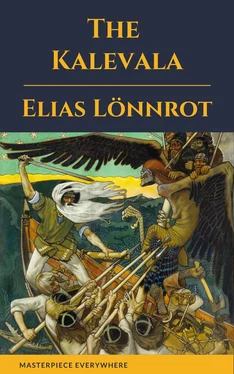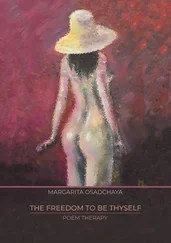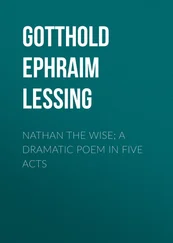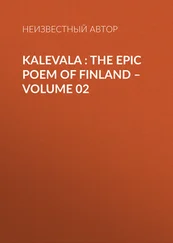"Why art weeping, beauteous Aino,
Aino, my beloved sister?"
"Cause enough for weeping, sister,
Good the reasons for my sorrow:
Therefore come I as thou seest,
On my head no scarlet fillet,
In my hair no braids of silver,
On mine arms no purple ribbons,
Round my neck no shining necklace,
On my breast no golden crosslet,
In mine ears no golden ear-rings."
Near the door-way of the dairy,
Skimming cream, sat Aino's mother.
"Why art weeping, lovely Aino,
Aino, my devoted daughter?"
Thus the sobbing maiden answered;
"Loving mother, all-forgiving,
Cause enough for this my weeping,
Good the reasons for my sorrow,
Therefore do I weep, dear mother:
I have been within the forest,
Brooms to bind and shoots to gather,
There to pluck some birchen tassels;
Bound a bundle for my father,
Bound a second for my mother,
Bound a third one for my brother,
For my sister silken tassels.
Straightway then I hastened homeward,
By a foot-path left the forest;
As I reached the woodland border
Spake Osmoinen from the cornfield,
Spake the ancient Wainamoinen:
'Wear not, beauteous maid, for others,
Only wear for me, sweet maiden,
On thy breast a golden crosslet,
Shining pearls upon thy shoulders,
Bind for me thine auburn tresses,
Weave for me thy silver braidlets.'
Then I threw the gold-cross from me,
Tore the jewels from my fingers,
Quickly loosed my shining necklace,
Quick untied my silken ribbons,
Cast them all away indignant,
Into forest ferns and flowers.
Then I thus addressed the singer:
'Not for thee and not for others,
Hang I from my neck the crosslet,
Deck my hair with silken ribbons;
Need no more the many trinkets,
Brought to me by ship and shallop;
Sooner wear the simplest raiment,
Feed upon the barley bread-crust,
Dwell forever with my mother
In the cabin with my father.'"
Thus the gray-haired mother answered
Aino, her beloved daughter:
"Weep no more, my lovely maiden,
Waste no more of thy sweet young-life;
One year eat thou my sweet butter,
It will make thee strong and ruddy;
Eat another year fresh bacon,
It will make thee tall and queenly;
Eat a third year only dainties,
It will make thee fair and lovely.
Now make haste to yonder hill-top,
To the store-house on the mountain,
Open there the large compartment,
Thou will find it filled with boxes,
Chests and cases, trunks and boxes;
Open thou the box, the largest,
Lift away the gaudy cover,
Thou will find six golden girdles,
Seven rainbow-tinted dresses,
Woven by the Moon's fair daughters,
Fashioned by the Sun's sweet virgins.
In my young years once I wandered,
As a maiden on the mountains,
In the happy days of childhood,
Hunting berries in the coppice;
There by chance I heard the daughters
Of the Moon as they were weaving;
There I also heard the daughters
Of the Sun as they were spinning
On the red rims of the cloudlets,
O'er the blue edge of the forest,
On the border of the pine-wood,
On a high and distant mountain.
I approached them, drawing nearer,
Stole myself within their hearing,
Then began I to entreat them,
Thus besought them, gently pleading:
'Give thy silver, Moon's fair daughters,
To a poor, but worthy maiden;
Give thy gold, O Sun's sweet virgins,
To this maiden, young and needy.'
Thereupon the Moon's fair daughters
Gave me silver from their coffers;
And the Sun's sweet shining virgins
Gave me gold from their abundance,
Gold to deck my throbbing temples,
For my hair the shining silver.
Then I hastened joyful homeward,
Richly laden with my treasures,
Happy to my mother's cottage;
Wore them one day, than a second,
Then a third day also wore them,
Took the gold then from my temples,
From my hair I took the silver,
Careful laid them in their boxes,
Many seasons have they lain there,
Have not seen them since my childhood.
Deck thy brow with silken ribbon,
Trim with gold thy throbbing temples,
And thy neck with pearly necklace,
Hang the gold-cross on thy bosom,
Robe thyself in pure, white linen
Spun from flax of finest fiber;
Wear withal the richest short-frock,
Fasten it with golden girdle;
On thy feet, put silken stockings,
With the shoes of finest leather;
Deck thy hair with golden braidlets,
Bind it well with threads of silver;
Trim with rings thy fairy fingers,
And thy hands with dainty ruffles;
Come bedecked then to thy chamber,
Thus return to this thy household,
To the greeting of thy kindred,
To the joy of all that know thee,
Flushed thy cheeks as ruddy berries,
Coming as thy father's sunbeam,
Walking beautiful and queenly,
Far more beautiful than moonlight."
Thus she spake to weeping Aino,
Thus the mother to her daughter;
But the maiden, little bearing,
Does not heed her mother's wishes;
Straightway hastens to the court-yard,
There to weep in bitter sorrow,
All alone to weep in anguish.
Waiting long the wailing Aino
Thus at last soliloquizes:
"Unto what can I now liken
Happy homes and joys of fortune?
Like the waters in the river,
Like the waves in yonder lakelet,
Like the crystal waters flowing.
Unto what, the biting sorrow
Of the child of cold misfortune?
Like the spirit of the sea-duck,
Like the icicle in winter,
Water in the well imprisoned.
Often roamed my mind in childhood,
When a maiden free and merry,
Happily through fen and fallow,
Gamboled on the meads with lambkins,
Lingered with the ferns and flowers,
Knowing neither pain nor trouble;
Now my mind is filled with sorrow,
Wanders though the bog and stubble,
Wanders weary through the brambles,
Roams throughout the dismal forest,
Till my life is filled with darkness,
And my spirit white with anguish.
Better had it been for Aino
Had she never seen the sunlight,
Or if born had died an infant,
Had not lived to be a maiden
In these days of sin and sorrow,
Underneath a star so luckless.
Better had it been for Aino,
Had she died upon the eighth day
After seven nights had vanished;
Needed then but little linen,
Needed but a little coffin,
And a grave of smallest measure;
Mother would have mourned a little,
Father too perhaps a trifle,
Sister would have wept the day through,
Brother might have shed a tear-drop,
Thus had ended all the mourning."
Thus poor Aino wept and murmured,
Wept one day, and then a second,
Wept a third from morn till even,
When again her mother asked her:
"Why this weeping, fairest daughter,
Darling daughter, why this grieving?
Thus the tearful maiden answered:
Therefore do I weep and sorrow,
Wretched maiden all my life long,
Since poor Aino, thou hast given,
Since thy daughter thou hast promised
To the aged Wainamoinen,
Comfort to his years declining
Prop to stay him when he totters,
In the storm a roof above him,
In his home a cloak around him;
Better far if thou hadst sent me
Far below the salt-sea surges,
To become the whiting's sister,
And the friend of perch and salmon;
Better far to ride the billows,
Swim the sea-foam as a mermaid,
And the friend of nimble fishes,
Читать дальше












